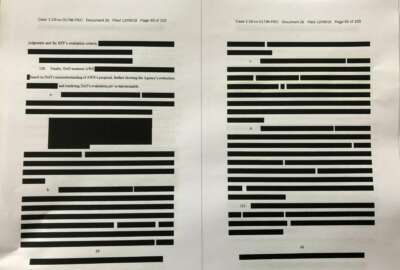With less than a month to go before the Pentagon and Microsoft get to work on building the military’s new Joint Enterprise Defense Infrastructure (JEDI) cloud, Amazon Web Services said Monday that it would ask a court to temporarily block any meaningful work under the controversial contract.
AWS gave notice of its plans as part of a status update its attorneys and the Justice Department filed jointly with the Court of Federal Claims. As part of the company’s bid protest lawsuit, its lawyers have previously said they were considering asking the court for a preliminary injunction, but the latest filing is the first concrete indication of their plans.
DoD has already said it intends to issue Microsoft the first “substantive” task order to begin building the unclassified portions of JEDI by Feb. 11. Because AWS wants to stop the work before then, and because DoD considers the project urgent to national security, lawyers for all three parties have already agreed on an expedited schedule for the court to consider either a preliminary injunction or temporary restraining order.
Judge Patricia E. Campbell-Smith would still need to agree to that schedule, but under the proposal, AWS plans to file its formal request to block work on JEDI by Jan. 24. DoD and Amazon would then have a little more than a week to respond with their filings asking the judge to deny it, and the court would issue a final ruling by Feb. 11, the day DoD plans to issue the first task order.
Unlike bid protests at the Government Accountability Office, stays are not automatic when losing bidders challenge contracts at the Court of Federal Claims, and a judge must specifically issue an injunction or restraining order to stop work on a contested contract while the legal challenge unfolds.
Monday’s joint filing did not shed any light on why AWS has chosen to wait until now before attempting to block performance of the contract. But government attorneys hinted they may seek to challenge Amazon’s motion on the grounds that the company could and should have filed it earlier.
“The United States and Microsoft note that, in agreeing to the above schedule for briefing of AWS’s intended motion for temporary restraining order and/or preliminary injunction, they expressly reserve their right to object to the timeliness of AWS’s proposed motion,” attorneys wrote.
Amazon first filed its legal challenge on Nov. 22, nearly a month after DoD’s surprise announcement that it had chosen Microsoft for the up-to-$10 billion infrastructure-as-a-service and platform-as-a-service contract.
Among other claims, AWS contends the award decision was tainted by political bias, and has pointed to numerous examples in which President Trump has made derisive comments about the company, its founder Jeff Bezos, and early perceptions that DoD had structured the procurement in Amazon’s favor. Its lawsuit also asserts the Pentagon made several late-in-the-game changes to its award criteria that unfairly tilted the balance in Microsoft’s favor.
In another indication that DoD is eager to finish the latest round of JEDI litigation as soon as possible, government attorneys also said in Monday’s filing that they do not intend to file a detailed answer to Amazon’s complaint.
Rather, both the government and Amazon will move directly to the stage of litigation where each party files “cross motions” that ask the judge to settle the case in their favor — a typical way in which bid protest cases are finalized at the court.
Copyright
© 2024 Federal News Network. All rights reserved. This website is not intended for users located within the European Economic Area.

